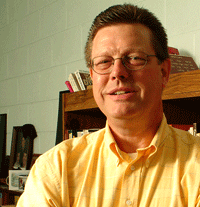 |
intersect
The Greatest Presidential Speech
INTERSECT (Where the Bible Meets Life) is a regular column of ONE Magazine featuring Dr. Garnett Reid, a member of the Bible faculty at Free Will Baptist Bible College. Email Garnett greid@fwbbc.edu |
Question: What's the shortest book published in the last 30 years?
Answer: The one on memorable speeches by U.S. Presidents.
The Spin Cycle
That’s not a great joke, but it does make a point. Presidential speeches today seem to give us the “same old, same old” we’ve come to expect. And why shouldn’t they? The president doesn’t even write most of these addresses. Speechwriters and spin doctors craft the phrases; the chief executive just gives his approval.
What’s more, the media get a draft of the speech before it’s even delivered so they can tell us what the commander-in-chief will say. Then they tell us whether we should like it or not (usually not, they suggest). They especially frown on one topic that should be off limits: religion.
That wasn’t the case with the greatest presidential speech in American history, however.
Behind It All
Next year marks the 200th anniversary of Abraham Lincoln’s birth. The nation’s 16th president was at his best on a wet, dreary Saturday, March 4, 1865, when he took the oath of office for the second time. Forty-one days later he was dead.
What he said in those 703 words, though, lives for all time as a testimony to the sweeping impact of a biblical worldview on a leader and a nation in a time of crisis.
During the previous four years, the nation had faced the very real possibility of splitting into two countries.
Now, in the war’s twilight, Lincoln sought to examine what lay ahead for the reunited country he envisioned. His astonishing premise was that God Himself was behind the war!
Four Texts
The president proceeded to look at the conflict through biblical lenses. This should not surprise us because mid-18th century American life was saturated with the Bible. In fact, the Great Emancipator had steeped himself in the Scriptures. He had read and memorized its passages all his life.
Standing on the Capitol steps for the final time, he reminded his listeners that both sides in the conflict “read the same Bible, and pray to the same God; and each invokes His aid against the other…The prayers of both could not be answered; that of neither has been answered fully. The Almighty has His own purposes.”
He goes on to allude to four specific Bible references. “It may seem strange that any men should dare to ask a just God’s assistance in wringing their bread from the sweat of other men’s faces” (see Genesis 3:19); “but let us judge not that we be not judged” (see Matthew 7:1).
Referring to slavery, Lincoln cited Matthew 18:7: “Woe unto the world because of offenses! For it must needs be that offenses come; but woe to that man by whom the offense cometh!” Whatever God’s will, “the judgments of the Lord are true and righteous altogether,” the president concluded (see Psalm 19:9).
How Sweet the Words
When he had read the 25 sentences in a little over five minutes, the lanky Midwestern plowman leaned over toward his wife Mary who held a Bible and kissed the words of Isaiah 5:27-28 opened on the page. In so doing he left us a legacy of “malice toward none” and “charity for all,” the heritage of a leader emboldened to see the world through the eyes of faith. May God raise up such leaders in our day of crisis.
|

